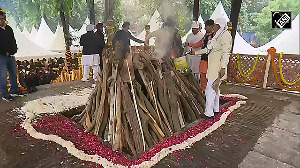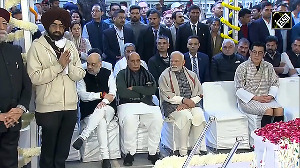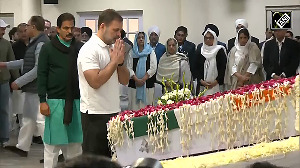India's top nuclear scientist will visit Vienna this week for talks with the International Atomic Energy Agency on a safeguards accord proposed under the Indo-US nuclear deal.
The accord will pave the way for resumption of nuclear fuel for Indian reactors.
Chairman of the Atomic Energy Commission Anil Kakodkar will also discuss with IAEA representatives an Additional Protocol as agreed in the Indo-US nuclear deal reached during the recent visit of President George W Bush.
The plan to separate India's civilian and military nuclear facilities provides for an India-specific safeguards agreement to be negotiated with the IAEA.
New Delhi has sought such an agreement since neither is India a member of the NPT nuclear powers comprising the P-5 countries nor does it come under the category of non-nuclear weapon states.
This is a process the AEC chairman will be undertaking at Vienna prior to tripartite arrangement with the US.
This process would involve the understanding as well as putting forth India's stance on the nuances of the 'India specific' safeguards.
"This process is very essential as a preparation to deal with the Nuclear Suppliers' Group from whom India is expected to buy fuel to increase the electricity base capacity which will be put under IAEA safeguards," a top DAE official said.
Safeguards of IAEA are to prevent diversion of nuclear material for weapon's programme. They are complemented by controls on the export of sensitive technology from countries such as UK and the USA through NSG.
The main concern of the IAEA is that uranium should not be enriched beyond what is necessary for commercial civil plants, and that plutonium which is produced by nuclear reactors should not be refined into a form that would be suitable for bomb production. There are different types of safeguards.
Each of the nuclear weapons state has concluded separate safeguards agreements with the IAEA, listing specific facilities offered for safeguards. Under the proposed agreement with the IAEA, India too would include a list of facilities offered for IAEA safeguards.
It is expected to contain protection against withdrawal of safeguarded nuclear material for civilian use at any time.
Prime Minister Manmohan Singh has made it clear that this agreement will be negotiated so that India will be permitted to take corrective measures to ensure uninterrupted operations of civilian nuclear reactors in the event of disruption of foreign nuclear supplies.
In 1993, a program was initiated to strengthen and extend the classical safeguards system (created mainly for countries like Iraq), and the IAEA Board of Governors agreed on a model protocol in 1997 called Additional Protocol.
The measures boosted the IAEA's ability to detect undeclared nuclear activities, including those with no connection to the civil fuel cycle.
Currently, 107 states have signed the protocol that is in force in 75 states, according to a latest IAEA publication.
According to the model Additional Protocol, the IAEA is to be given considerably more information on nuclear and nuclear-related activities, including R & D, production of uranium and regardless of whether it is traded, and nuclear-related imports and exports.
IAEA inspectors will have greater rights of access. This will include any suspect location and it can be at short notice. The IAEA can also deploy environmental sampling and remote monitoring techniques to detect illicit activities.
States must streamline administrative procedures so that IAEA inspectors get automatic visa renewal and can communicate more readily with IAEA headquarters.
Further evolution of safeguards is towards evaluation of each state, taking account of its particular situation and the kind of nuclear materials it has. This will involve greater judgment on the part of IAEA and the development of effective methodologies that reassure NPT States.
Nuclear scientists have expressed concerns over the implementation of Additional Protocol as IAEA inspectors could come anytime, anywhere and even to the research institutions which are placed under safeguards.
Dr A N Prasad, who worked on the Additional Protocol for IAEA from the day it was created, told PTI that even ideas, planning can be questioned.
"In the current status, only when we have significant quantity (at least eight kg of Plutonium and 25 kg of U-235 uranium), we have to report to IAEA whereas with the Additional Protocol in place, we have to inform even when we have one gram fissile material.
"Unless, it is cleverly negotiated using all embracing nuances step by step, the third party -- the US -- can say at any time that India is not cooperating," Prasad said.
Dr Singh stated in Parliament last month that 14 out of the 22 nuclear plants will be placed under civilian category for IAEA safeguards.
Nuclear analysts said six nuclear plants are already under IAEA safeguards and "if eight more of the 220 MW reactors are put under safeguards, the separation plan will not adversely affect the strategic requirement provided all the accumulated reactor fuels from these reactors do not come under safeguards retroactively.
They contended since the entire fuel cycle and its derivatives will come under scrutiny with the Perpetuity Clause in effect, such a caveat will not matter if India does not require reactor produced Plutonium. It is clear that this Plutonium cannot be diverted later for military use should the need ever arise.






 © 2024 Rediff.com -
© 2024 Rediff.com -